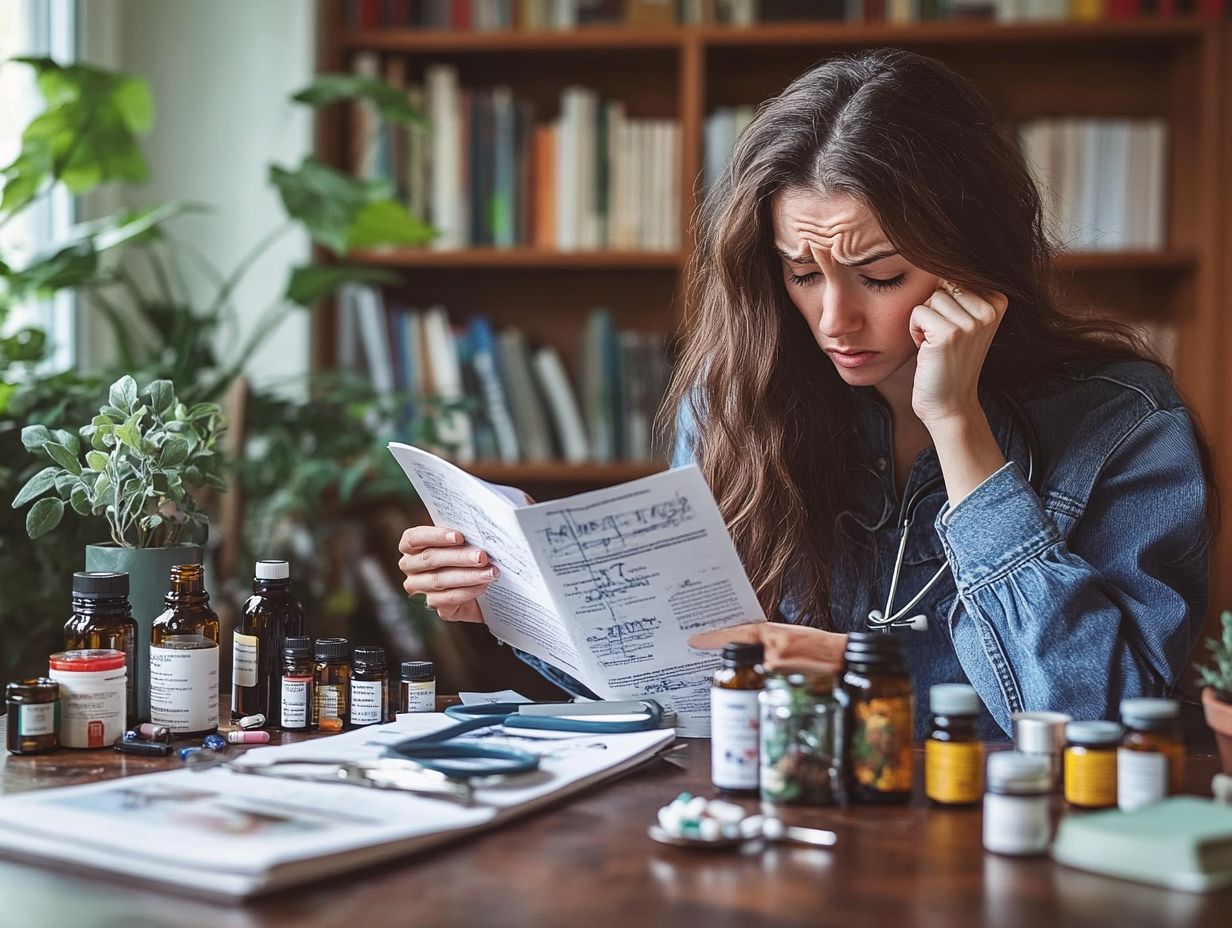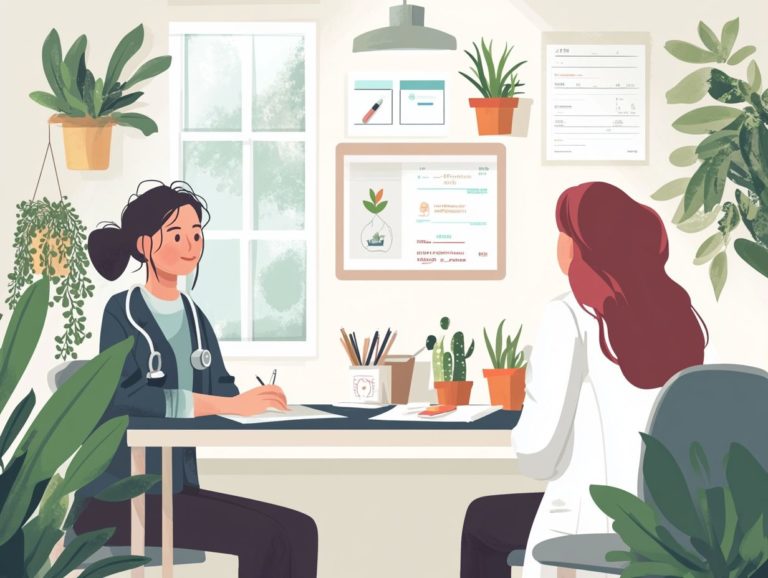What Are the Risks of Alternative Medicine?
Alternative medicine has captured considerable interest in recent years, presenting a variety of approaches to health and wellness that often diverge from traditional practices. Grasping what alternative medicine truly entails its diverse types, potential risks, and regulatory environment is crucial for making well-informed decisions.
This article serves as your guide through the intricacies of alternative medicine, illuminating safety concerns, assessing treatment options, and examining the benefits and drawbacks of blending these practices with conventional healthcare. Dive into this exciting journey of health exploration now!
Contents
- Key Takeaways:
- Understanding Alternative Medicine
- Potential Risks of Alternative Medicine
- Regulation of Alternative Medicine
- How to Evaluate Alternative Medicine
- Combining Alternative and Conventional Medicine
- Frequently Asked Questions
- What Are the Risks of Alternative Medicine?
- Is alternative medicine safe?
- What are some potential risks of herbal remedies?
- Can alternative medicine delay or replace necessary medical treatment?
- Are there any specific risks associated with energy healing?
- Is it important to consult with a healthcare professional before trying alternative medicine?
Key Takeaways:

- Alternative medicine includes practices with limited scientific support.
- Lack of regulation can lead to unsafe treatments.
- Integrative medicine combines conventional and alternative treatments but requires caution.
Understanding Alternative Medicine
Understanding alternative medicine invites you to explore a diverse array of healing methods that transcend conventional approaches. This includes complementary medicine that champions a holistic perspective on health and wellness.
This journey may lead you to therapies like acupuncture, yoga, and herbal remedies, all designed to enhance mental clarity and support your body s innate healing abilities. Many individuals pursue alternative options when they feel traditional treatments fall short or when they seek natural substances to manage chronic conditions more effectively.
Defining Alternative Medicine and Its Types
Alternative medicine encompasses a range of therapeutic practices that extend beyond the boundaries of conventional medicine. This includes an impressive array of treatments such as acupuncture, yoga, and various herbal remedies, all crafted to enhance your health outcomes. This vast field also incorporates modalities like dietary supplements, homeopathy, and naturopathic approaches, each designed to promote healing and overall well-being.
At the heart of integrative medicine lies a holistic philosophy that acknowledges the intricate connections between your mind, body, and spirit. By considering your unique health landscape, practitioners of alternative medicine strive to treat you as a whole person, rather than merely addressing isolated symptoms.
These practices place significant emphasis on personal responsibility and the impact of lifestyle choices on your health. They cultivate a collaborative environment where you are enabled to actively engage in your own healing journey, making informed decisions that resonate with your individual needs and aspirations.
Potential Risks of Alternative Medicine
Alternative medicine offers benefits, but you must carefully evaluate the potential risks. Pay particular attention to the safety assessment of unproven therapies and their implications. This is especially important when it comes to cancer treatment.
Unproven Effectiveness and Safety Concerns

Unproven effectiveness and safety concerns loom large in the realm of alternative medicine. Many herbal products and dietary supplements lack the rigorous research evidence needed to substantiate their claimed benefits. This gap in scientific validation should raise alarm bells for you, particularly when it comes to potential interactions with conventional medications that could worsen health issues.
The inconsistency in product quality and the absence of standardized dosages only add to the complexity of safety assessments. It s understandable that you might turn to these alternatives out of frustration with traditional treatments, but consulting healthcare professionals who can offer evidence-based guidance is essential.
Taking an informed approach ensures your choices are not only safe but also effective, reinforcing the importance of systematically evaluating any proposed treatment against conventional medical standards.
Consult a healthcare professional today to discuss the best options for your health!
Regulation of Alternative Medicine
Regulation of alternative medicine varies considerably by region, reflecting diverse levels of oversight that govern the use of medical products, including herbal remedies, dietary supplements, and various therapeutic practices.
Understanding this landscape is crucial for navigating the complexities of alternative treatments effectively.
Current Regulations and Oversight
Current regulations and oversight for alternative medicine involve the mix of federal and state rules, especially regarding the sale and use of herbal remedies and dietary supplements.
These frameworks are designed to ensure that you, as a practitioner, adhere to established safety standards while providing care to your patients. Various government agencies, including the Food and Drug Administration (FDA) and the Federal Trade Commission (FTC), play vital roles in monitoring these practices.
They regulate claims about the efficacy of alternative treatments and ensure that products do not pose unnecessary risks. Compliance with these regulations is crucial for protecting patient health and fostering trust in healthcare systems.
As a practitioner, navigating this regulatory landscape is essential. Noncompliance can lead to serious legal repercussions, including fines and a significant loss of credibility.
How to Evaluate Alternative Medicine
Evaluating alternative medicine demands a discerning eye. You are encouraged to pose essential questions about the efficacy, safety, and context of different therapeutic methods.
This critical approach enables you to make informed decisions tailored to your health and well-being.
Questions to Ask and Red Flags to Look For
When evaluating alternative medicine, it’s essential for you to inquire about the safety evaluations of therapeutic practices and remain alert for any red flags that could indicate unproven treatments.
Consider several key questions, such as the research evidence backing a specific therapy and the qualifications or experiences of the practitioners delivering the treatment.
It s prudent to ask about the potential risks and side effects associated with these alternative options. Be cautious of any practitioner who guarantees miraculous results or makes sweeping claims without solid scientific backing; these often signal a lack of transparency.
Trustworthy providers will be open about the limitations of their methods and ready to share evidence-based information to support their practices.
Combining Alternative and Conventional Medicine
Combining alternative and conventional medicine, known as integrative medicine, can offer a rich tapestry of benefits and risks. It s essential to honor patient preferences while guiding them toward informed choices, ensuring they navigate this nuanced landscape with confidence and clarity.
Benefits and Risks of Integrative Medicine
The benefits of integrative medicine may include enhanced pain management, stress reduction, and improved overall health. However, you must be mindful of the potential risks when blending alternative and conventional therapies.
As you explore integrative medicine, you might discover that combining therapies, such as acupuncture with standard medication, can significantly elevate your recovery journey. For example, a case study involving cancer patients who engaged in yoga and mindfulness alongside their conventional treatments reported a noticeable decrease in anxiety and pain levels.
This holistic approach not only targets physical symptoms but also nurtures your emotional well-being, leading to greater satisfaction with your healthcare experience.
If communication between practitioners falls short, you could face adverse interactions. For instance, herbal supplements might interfere with prescribed medications, making careful monitoring essential.
Thus, while integrating various treatment modalities can be advantageous, it should be approached with caution and ideally under professional guidance.
Frequently Asked Questions
What is alternative medicine?
Alternative medicine refers to medical practices that are not considered standard in conventional medicine. It encompasses a variety of practices, including herbal remedies, acupuncture, and homeopathy.
Is alternative medicine safe?
Not all alternative treatments are safe. It’s crucial to evaluate the safety and efficacy of any alternative therapy and consult healthcare professionals before starting any new treatment.
Can I combine alternative and conventional medicine?
Yes, many patients safely combine alternative and conventional treatments. However, it’s essential to discuss this with your healthcare provider to minimize risks and ensure effective communication between all practitioners involved.
What Are the Risks of Alternative Medicine?

Alternative medicine, also known as complementary or holistic medicine, refers to medical treatments and practices that are not part of mainstream medicine. These treatments can include herbal remedies, acupuncture (a treatment that involves inserting thin needles into the skin), energy healing, and homeopathy.
While alternative medicine can offer benefits, it also carries potential risks. We will address these risks in the following FAQs.
Is alternative medicine safe?
Some forms of alternative medicine are safe, while others may pose risks. Many lack rigorous studies that prove their safety and effectiveness. Some alternative medicine practices may interact negatively with conventional medications or have harmful side effects.
What are some potential risks of herbal remedies?
Herbal remedies, commonly used in alternative medicine, can contain active ingredients that may interact with medications or cause allergic reactions. They may also have adverse effects on the body. Herbal products are not strictly regulated, which means their potency and purity can vary greatly, increasing the risk of side effects.
Can alternative medicine delay or replace necessary medical treatment?
One major risk of alternative medicine is that it may delay or replace necessary medical treatment. Many alternative therapies lack scientific evidence for their effectiveness. Relying solely on these treatments can lead to delays in receiving proper medical care, which can have serious consequences, especially in cases where early treatment is crucial.
Are there any specific risks associated with energy healing?
Energy healing, which involves touch or manipulation to channel energy for healing, can carry risks. These can include misdiagnosis, psychological harm, and even physical injury from improper techniques or manipulation of sensitive areas of the body.
Is it important to consult with a healthcare professional before trying alternative medicine?
Always consult a healthcare professional before trying alternative medicine to stay safe and informed. They can help you evaluate the potential risks and benefits of treatments. This ensures they do not interfere with any existing medical conditions or medications. They can also guide you in finding reputable practitioners and determining proper dosages of supplements or herbs.







